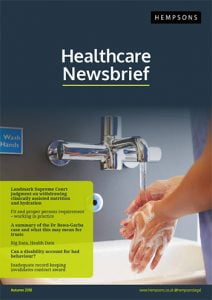Hempsons’ Healthcare Newsbrief 2018
 Welcome to this autumn edition of Hempsons’ healthcare newsbrief.
Welcome to this autumn edition of Hempsons’ healthcare newsbrief.
The newsbrief is available in full here.
It has been a busy few months for the NHS in the legal system with some ground-breaking decisions on key areas such as withdrawing clinically-assisted nutrition and hydration, fitness to practice and procurement. Sadly, many trusts will have had experience of cases where patients have little prospect of recovery and have what is termed a prolonged disorder of consciousness.
Withdrawing clinically-assisted nutrition and hydration in these cases – and allowing the patient to die – has involved an application to the courts. A recent Supreme Court decision has clarified that this does not need to happen automatically, as Helen Claridge explains.
Boards will need to be aware of the ongoing review of the fit and proper persons requirement – something which all board members have to meet. Andrew Davidson looks at the changes which are being considered, especially around what being of “good character” means.
Many NHS executives will have been aware of the case of Dr Hadiza Bawa-Garba who was found guilty of manslaughter by gross negligence and the concerns it has engendered among fellow clinicians. Laura McIntyre reports on the recent Court of Appeal ruling on this case and what it could mean for the health service.
Using massive datasets to plan and improve patient care and develop new treatments offers enormous opportunities for the NHS and its partners – but many organisations have been concerned about how data can be used within the law. Chris Alderson looks at some of the restrictions and how they could be overcome. He concludes that it is possible to use data in this way and still comply with the General Data Protection Regulation and other laws – but trusts will need to tread carefully and potentially take advice on the safeguards they need to build into any projects.
Lucy Miles looks at a recent Employment Tribunal case involving the dismissal of a staff member where there was a lack of consensus among clinicians over whether a mental illness could have contributed to her behaviour.
The importance of considering all relevant evidence, testing it and giving it proper weight came through in this case, which the trust lost.
Procurement is an area full of pitfalls. In our last article, we look at a case where a local authority awarded a contract to a private provider but was then challenged in the courts by two NHS trusts who had also bid. The judge
looked in great depth at how the tender was awarded and found the council’s process wanting. Procurement expert Andrew Daly looks at the ramifications of this decision for NHS organisations – whether they are
bidding for a contract or awarding one. We hope these articles give you food for thought as you prepare for the challenges of the months to come.
A list of all the articles is below:
